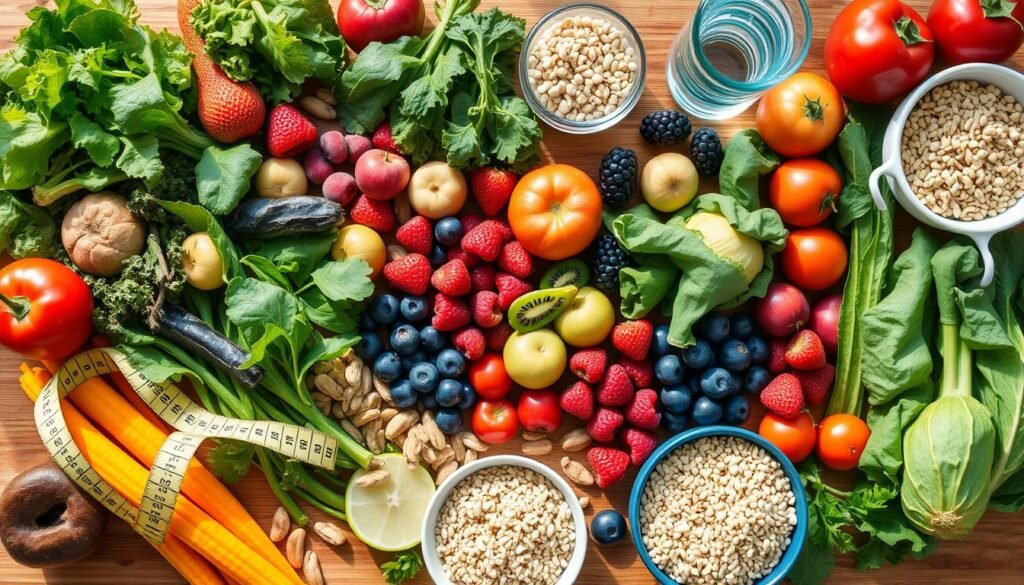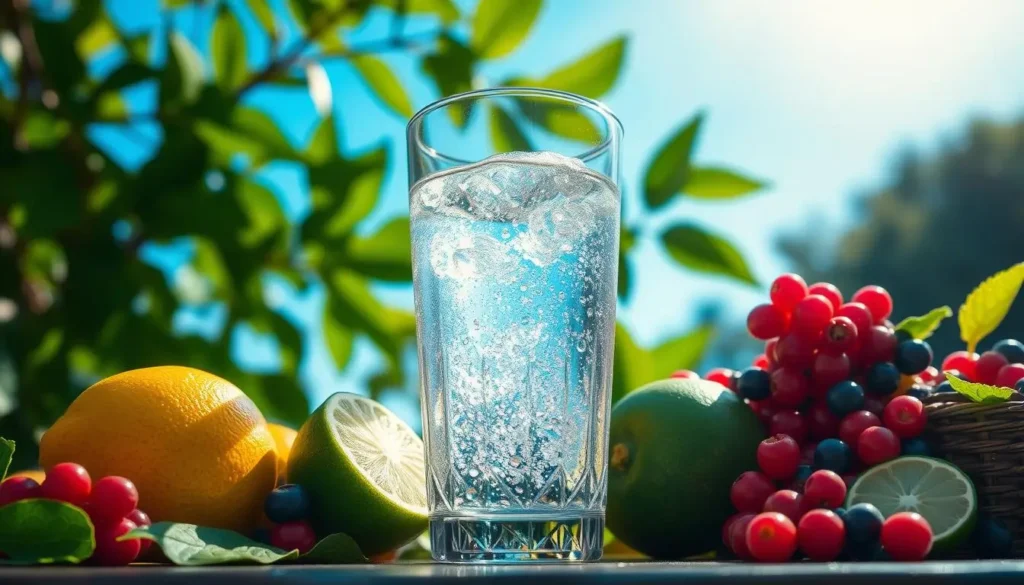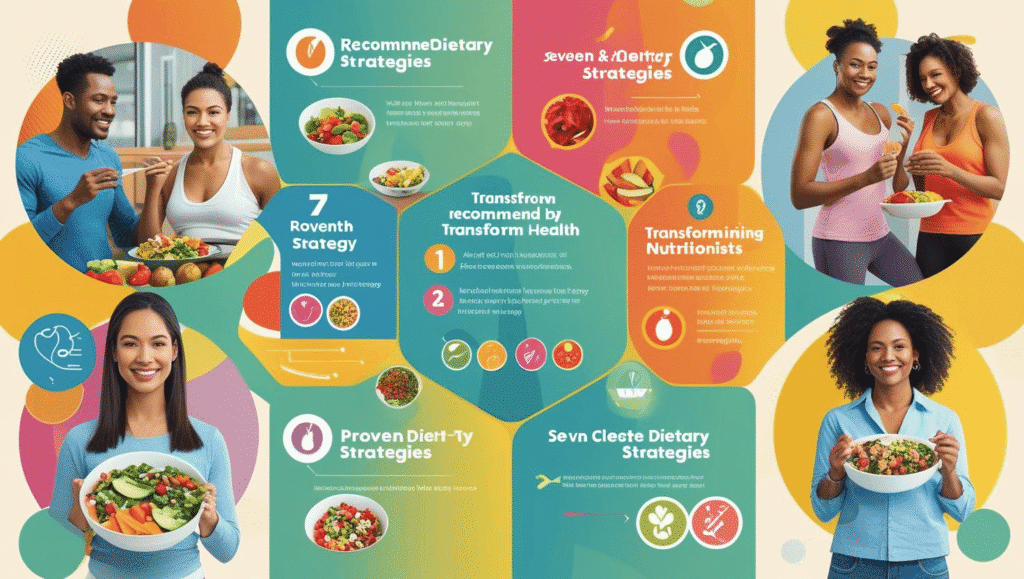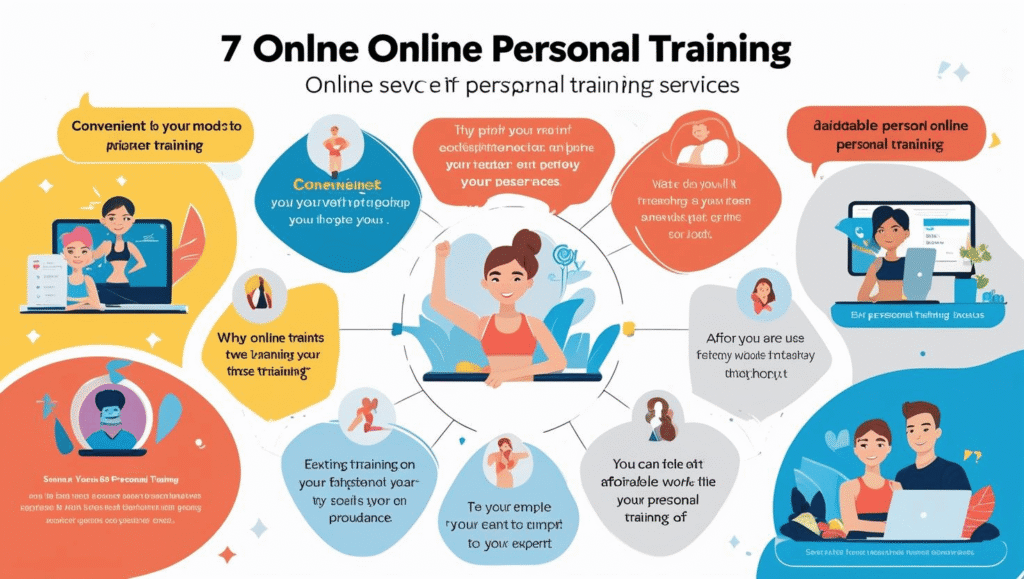Are you having trouble keeping a balanced diet? Wondering how to feed your body the right stuff? You’re in the right place! This guide will share key nutrition tips to improve your health and feel better.
Learn about foods that are full of nutrients, how to plan meals, and ways to take care of your body. It’s all about nourishing you from the inside out.

Table of Contents
Key Takeaways
- Prioritize nutrient-dense foods like fruits, vegetables, whole grains, and lean proteins for a balanced diet
- Limit sugar-sweetened beverages and ultra-processed foods to reduce the risk of chronic diseases
- Incorporate healthy fats, such as those found in nuts, seeds, and extra virgin olive oil, for heart health
- Maintain adequate hydration and prioritize quality sleep for optimal bodily function
- Engage in regular physical activity and avoid harmful habits like smoking and excessive alcohol consumption
Limit Sugary Drinks
Sugary drinks like sodas and fruit juices are bad for us. They can make our hearts sick and cause diabetes. Kids under 2 should not have any sugar in their drinks.
For older kids and adults, the goal is to have less than 10% of daily calories from sugar.
Healthier Alternatives
Drink water, unsweetened teas, and coffee instead. Cutting out two sodas a day can save 2,100 calories a week. Try to have less than 50 grams of sugar a day, and no sugar for kids under 2.
Energy drinks have too much caffeine and sugar. Always check what’s in your drinks. Drinks with cane juice or corn syrup are bad.
Sugary drinks are full of calories and sugar. A soda can has 150 calories, almost all sugar. Kids and teens in the U.S. get 224 calories a day from these drinks.
Half of Americans drink sugary drinks every day. They get 200 calories from these drinks.
Drinks are the main source of sugar for kids. Drinking one sugary drink a day is too much. A soda bottle has 16 teaspoons of sugar. A glass of orange drink has 11 teaspoons.
Incorporate Nuts and Seeds
Nuts and seeds are very good for you. They have protein, fiber, and lots of vitamins and minerals. People think they are too fatty, but they can help you lose weight and keep your heart healthy.
It’s best to eat raw, unsalted nuts and seeds. They have a lot of calories and fats. But, eating about one ounce (28g) a day is okay. The healthy fats in them are good for your heart and help you lose weight.
- Chia seeds are rich in omega-3 fatty acids, promoting heart and joint health.
- Walnuts contain protein, omega-3 fatty acids, vitamins, and minerals that reduce bad cholesterol, improve metabolism, and possess anti-inflammatory properties.
- Some other high-protein nuts and seeds include hemp seeds, pumpkin seeds, almonds, cashews, and more.
You can add nuts and seeds to many foods. Try them in smoothies, pudding, yogurt, oats, salads, muffins, cakes, and even homemade chocolate bars. Eating more of these foods can give you healthy fats, protein, and other nutrients.
| Nut or Seed | Number of Recipes |
|---|---|
| Pecan | 7 |
| Almond | 6 |
| Cranberry | 5 |
| Pistachio | 2 |
| Walnut | 8 |
| Apple | 3 |
| Banana | 2 |
| Hazelnut | 1 |
| Peanut | 5 |
| Granola | 2 |
| Cookies | 9 |
| Pie | 4 |
| Cake | 3 |
| Cheesecake | 3 |
| Bread | 4 |
| Nut butter | 2 |
| Tart | 2 |
| Candy | 3 |
| Truffle | 1 |
| Breakfast | 2 |
| Salad | 1 |
| Cheese ball | 2 |
| Fudge | 1 |
| Muffin | 2 |
| Cracker | 1 |
| Toffee | 2 |
| French toast | 1 |
| Trail mix | 1 |
| Mousse pie | 1 |
| Granola bar | 1 |
| Appetizer | 1 |
This data shows how nuts and seeds can be used in many recipes. Adding them to your meals can make them taste better and be healthier. It’s good for your health and well-being.
“Soaking nuts and seeds overnight can enhance their nutritional value and make them more easily digestible. This simple practice can unlock the full health benefits of these superfoods.” – Dietitian Lavleen
Changing your diet is important. Always talk to a dietitian or nutrition expert before making big changes. Eating more nuts and seeds can help you stay healthy, lose weight, and avoid chronic diseases.
Avoid Ultra-Processed Foods
In today’s fast world, ultra-processed foods are everywhere. They have many additives and preservatives. These foods are far from their natural state.
Eating too much of these foods can harm your heart, make you gain weight, and even increase cancer risk. Research shows eating lots of ultra-processed foods can shorten your life.
Examples of Ultra-Processed Foods
Ultra-processed foods include snack cakes, fast food, and frozen meals. They are made to taste good but can lead to eating too many calories. A 2016 study found they have ingredients not found in cooking, plus lots of salt, sugar, oils, and fats.
Eating these foods can increase your risk of heart disease and cancer. Eating more of them can raise your cancer risk by 12%. People who eat these foods a lot gain 2 pounds in 2 weeks.
They also change your gut microbes in bad ways.
In the U.S. and the U.K., people eat over half their calories from these foods. The American Heart Association says men should not eat more than 9 teaspoons of added sugar a day. Women should not eat more than 6 teaspoons.
To eat less of these foods, cook at home, pack your lunch, and read food labels. Choose foods like fruits, veggies, whole grains, lean proteins, and spices instead.
“Ultra-processed foods are defined as ‘industrial formulations with five or more ingredients.'”
Embrace Coffee in Moderation
Coffee is loved by many for good reasons. It’s full of health benefits that can make our lives better. Drinking coffee can lower the risk of diseases like type 2 diabetes and Parkinson’s. It also helps our brains work better, boosts our energy, and can make us perform better in sports.
But, we should drink coffee in small amounts. Too much coffee can cause problems like anxiety and trouble sleeping. It can also make our hearts beat too fast or our blood pressure go up. Pregnant women should not drink too much coffee because it might harm their baby.
Finding the right amount of coffee is key. Everyone’s body reacts differently to coffee. Drinking black coffee or less sweet coffee is better for you. Also, drinking coffee in the morning is best to help you sleep well at night.
Enjoying coffee in the right amount lets you get its good points without the bad. It’s about finding that perfect balance to enjoy coffee’s benefits fully.

| Compound | Content Range (per 8 oz cup) |
|---|---|
| Chlorogenic Acid | 70-350 mg |
| Caffeic Acid | 20-200 mg |
| Trigonelline | 2-4 mg |
Choosing organic, fair-trade coffee helps farmers and the planet.
“The greatest weapon against stress is our ability to choose one thought over another.” – William James
Eat Fatty Fish
Fatty fish, like salmon, are great for your health. They are full of omega-3 fatty acids. These acids help fight inflammation and may lower the risk of chronic diseases.
Studies show eating fish often can lower heart disease, dementia, and inflammatory bowel disease risks.
Oily fish, such as salmon, sardines, mackerel, and trout, are very good for you. The American Heart Association says eat fish rich in unsaturated fats twice a week for heart health. White fish, like cod and haddock, are also good. They are low in fat and a healthy choice instead of red or processed meats.
But, there are things to watch out for. Pregnant women and kids should not eat too much of fish like shark, swordfish, and marlin because of mercury. It’s also smart to pick fish from places that take care of the ocean.
When you eat fish, make sure to store and cook it right. This is especially true for raw shellfish like oysters. By eating fatty fish and following safe food handling, you can get lots of health benefits.
| Fish Type | Recommended Intake | Key Considerations |
|---|---|---|
| Oily Fish (Salmon, Sardines, Mackerel, Trout) | At least 2 portions per week, including 1 of oily fish | High in omega-3 fatty acids, beneficial for heart health |
| White Fish (Cod, Haddock) | Low in fat, a healthy alternative to red or processed meats | Provide a nutritious option |
| Shellfish (Prawns, Scallops) | Low in fat, a good source of selenium, zinc, iodine, and copper | Proper storage and cooking is crucial to prevent food poisoning |
| High-Mercury Fish (Shark, Swordfish, Marlin) | Avoid for pregnant women, those planning pregnancy, and children | Mercury levels can be harmful to fetal and child development |
“Eating at least two servings of fish a week could reduce the risk of heart disease.”
By eating different kinds of fatty fish and following safe food handling, you can get lots of health benefits.
Prioritize Sleep
Sleep is key for health and wellness. Kids need nine hours a night. Teens should sleep eight to 10 hours. Adults need seven hours or more.
But, almost one-third of Americans sleep less than they should.
Impacts of Poor Sleep
Not getting enough sleep is bad. It can make you gain weight and mess with your blood sugar. It also makes you tired and less sharp.
It can even lead to serious diseases like diabetes and heart problems. People who don’t sleep well might eat more junk food. They might also get fatter and more likely to be obese.
The brain cleans itself during sleep. It gets rid of bad stuff, like proteins linked to Alzheimer’s, faster when you sleep. But, older people might sleep worse, even though they still need lots of sleep.
Not sleeping enough can make you less smart and weakens your immune system. It can also make you more likely to get hurt while playing sports. It’s important to fix sleep problems to stay healthy.

“Making sleep a priority is emphasized as a biological necessity for everyone.”
Feed Your Gut Bacteria
The bacteria in your gut, called the gut microbiota, are very important for your health. Each person has about 200 different kinds of bacteria, viruses, and fungi in their gut. A healthy gut can help prevent diseases like diabetes and inflammatory bowel disease.
Research shows that gut health is linked to many conditions. This includes mental health issues, autoimmune diseases, and even cancer. Things like stress, not enough sleep, and eating too much sugar can harm your gut. Signs of a sick gut include stomach problems, weight changes, and skin issues.
To keep your gut healthy, eat foods like yogurt and sauerkraut. Also, eat lots of fiber from whole grains and veggies. Healthy fats in nuts and avocados are good for your gut too.
“A large variety of bacteria in the gut may help reduce the risk of conditions like diabetes, inflammatory bowel disease (IBD), and psoriatic arthritis.”
Changing your lifestyle and diet can help your gut health. A healthy gut is key to feeling good overall. So, focus on eating well to support your gut bacteria.
Stay Hydrated
Keeping your body hydrated is key for health. Our bodies are about 60% water. It’s important to drink water often to keep our bodies working right. Sadly, many people don’t drink enough water.
To drink enough, aim for 0.5 to 1 ounce of water per pound of your weight each day. You can drink water or eat foods with lots of water like cucumbers, iceberg lettuce, and celery.
| Food | Water Content (%) |
|---|---|
| Cucumbers | 96% |
| Iceberg Lettuce | 96% |
| Celery | 95% |
| Radishes | 95% |
| Romaine Lettuce | 95% |
| Tomatoes | 94% |
| Zucchini & Summer Squash | 94% |
Drinking water is best for staying hydrated. But, be careful with other drinks too. Drinks like coffee, tea, and soda can make you lose more water. It’s good to drink them in small amounts.
Older adults need to drink more water because they can get dehydrated easily. Also, watch how much alcohol you drink. It can make you dehydrated and add extra calories. Drinking in moderation helps keep you hydrated and healthy.
By drinking water and eating foods with lots of water, you help your body work well. This brings many health benefits.

“Proper hydration is not just about drinking water – it’s about nourishing your body with the fluids and nutrients it needs to function at its best.” – Sarah Adler, MS, RD
nutrition tips
Eating well is key for feeling good. There are many ways to make your diet better. These tips can help you eat healthier and feel better.
Try not to eat charred meats too often. They can have bad stuff in them. Instead, grill at lower heat, marinate, or choose lean meats.
Also, don’t look at screens before bed. The blue light can mess with your sleep. It’s best to avoid screens before you go to sleep.
Eat lots of fruits, veggies, whole grains, and lean proteins. This makes your meals balanced and full of nutrients. Drinking lots of water is also good for you.
By eating well and staying active, you can help your health a lot.
| Nutrient | Recommended Daily Intake | |
|---|---|---|
| Calories | Men: 2,500 calories | Women: 2,000 calories |
| Fruit and Vegetables | 80g per portion (fresh, canned, or frozen) | 30g per portion (dried) |
| Fish | At least 2 portions per week, including 1 portion of oily fish | |
| Saturated Fat | Men: No more than 30g | Women: No more than 20g |
| Salt | No more than 6g (about 1 teaspoon) | |
| Fluids | 6-8 glasses per day, including from food | |
| Fruit Juice, Vegetable Juice, and Smoothies | No more than 150ml per day |
Start your day with a healthy breakfast. It should be high in fiber and low in fat, sugar, and salt.
By following these tips, you can make your diet better. This will help you stay healthy and feel great.
Limit Charred Meats
Meat can be good for you, but bad cooking can make it harmful. When meat is charred or cooked too hot, it makes bad stuff called HCAs and PAHs.
Reducing Exposure to Harmful Compounds
To stay safe, eat less charred meats and processed meats. Eating too much red meat and processed meats can raise colon cancer risk.
Don’t burn meat when you cook it. Marinate meat for 30 minutes before cooking to cut down on HCAs. Cooking meat in the oven or microwave first can also help avoid PAHs.
Grilling fruits and veggies doesn’t make HCAs, even if they get charred. Drinking alcohol is actually worse for you than charred meat. It can expose you to more carcinogens.

Changing how you cook and what you eat can help you avoid these bad compounds. This can make you healthier and happier.
Minimize Blue Light Exposure Before Bed
Blue light from screens can hurt your sleep. It can mess with your body’s melatonin production. This can cause health issues like heart disease and depression.
Wear blue light-blocking glasses to help. They can help you sleep better. You can also use f.lux to make screens less bright at night.
Here are more tips to reduce blue light before bed:
- Turn off lights and screens 30 minutes to an hour before bed.
- Use red or orange lamps instead of white ones.
- Make your bedroom very dark.
- Get lots of blue light during the day.
By reducing blue light, you can help your body make more melatonin. This can make you sleep better.
Blue light glasses and other methods can help. But, some people still debate their effectiveness. Still, cutting down on blue light before bed is good for sleep and health.
Conclusion
Following the nutrition tips in this article can make your life healthier. Try to drink less sugary drinks and eat more nuts and seeds. Also, avoid ultra-processed foods and enjoy coffee in small amounts.
Eat fatty fish and get enough sleep. Feed your gut bacteria and drink lots of water. Watch out for charred meats and blue light too. This way, you’ll live a healthier life.
Small changes can really help your health. Eating foods like veggies, fruits, and nuts is good for you. It can even lower the risk of some diseases.
A diet full of fiber can make your gut healthier. It helps good bacteria grow, making you feel better overall.
Choosing healthy foods over ultra-processed ones is smart. It helps prevent chronic diseases and makes life better.
FAQ
What are some healthier alternatives to sugary drinks?
What are the benefits of incorporating nuts and seeds into a diet?
What are ultra-processed foods, and how can they impact health?
What are the health benefits of consuming coffee in moderation?
How can eating fatty fish benefit health?
What are the impacts of poor sleep on health?
How can you improve gut health?
What are some tips for staying hydrated?
How can you limit exposure to harmful compounds from charred meats?
How can you minimize blue light exposure before bed?
7 Essential Nutrition Books for Weight Loss That Actually Work in 2025
When it comes to sustainable weight loss, nutrition books for weight loss provide the foundational knowledge you need to transform your relationship with food. Unlike fad diets that promise quick fixes, the best weight loss books offer evidence-based strategies that create lasting change.
In today’s information-saturated world, finding reliable guidance can feel overwhelming. That’s why we’ve carefully curated this list of the most effective healthy eating books, each backed by scientific research and proven results from nutritional science experts.
Source Links
- 27 Health and Nutrition Tips That Are Actually Evidence-Based
- Rethink Your Drink
- Sugary Drinks
- Cutting Back on Sugary Drinks Improves Health
- 6 Ways To Incorporate Nuts And Seeds In Your Diet
- 8 Healthy Ways to Add Nuts to Your Diet
- Best Way to Consume Nuts and Seeds
- What Is Ultra-Processed Food and How Can I Avoid It?
- 11 Ultra-Processed Foods to Avoid and 22 Healthier Swaps
- < Ultra-processed foods are everywhere. Here’s how to avoid them
- The Paradox of Coffee: Navigating Health Benefits and Risks – SWEET INSTITUTE – Continuing Education for Mental Health Professionals
- Coffee and Wellness: A Holistic Approach
- Fish and shellfish
- How eating fish helps your heart
- Good Sleep for Good Health
- The Connection Between Diet, Exercise, and Sleep
- How to Improve and Reset Gut Health
- Adding key foods to a diet will help restore gut health – UW Medicine | Newsroom
- 15 foods that help you stay hydrated
- Water, Hydration, and Health | Nutrition.gov
- 8 tips for healthy eating
- Healthy Eating Tips
- Is Charring Your Meat Dangerous?
- Does grilling meat actually cause cancer? – Prevent Cancer Foundation
- How Blocking Blue Light at Night Helps You Sleep
- Blue Light: What It Is and How It Affects Sleep
- Ready For Bed? How to Stop Blue Light From Disturbing Your Sleep
- Healthy Eating 101: Nutrients, Macros, Tips, and More
- Benefits of eating healthy: Heart health, better mood, and more




